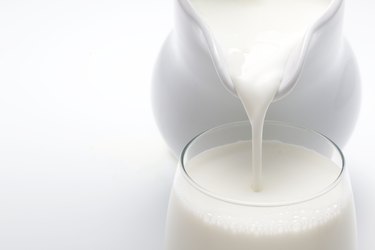
Gastroenteritis is that awful feeling you know as an upset stomach. You probably won't feel like eating much, if anything. A bland diet is the best way to go when an upset stomach hits. Gastroenteritis foods to avoid include spicy and fried foods.
Tip
You may not feel like eating much with an upset stomach, but experts suggest eating some foods after a few hours. Still, you don't want to eat anything spicy or drink sweetened beverages, including sodas.
Video of the Day
What Is Gastroenteritis?
Gastroenteritis occurs when the lining of the intestines becomes inflamed. It can be caused by a virus, infection or a parasite. It spreads through contaminated food or water, and through contact with someone who's infected, according to MedlinePlus. It's the second most common illness in the U.S., and most people can recover without medical intervention.
Video of the Day
The Mayo Clinic says symptoms include:
- Nausea
- Vomiting
- Diarrhea
- Stomach cramps
- Low-grade fever (sometimes)
Sometimes called the 24-hour bug or gastro-oesophogeal reflux, your symptoms may last only one day or up to a week. While you're actively vomiting, you may want to drink a beverage with electrolytes, with no sugar or caffeine, to keep your body hydrated. Typically, coffee and gastro-oesophageal reflux don't go together.
Once you've stopped vomiting, it's important to eat small amounts of food, says the government of Quebec. Eating helps the lining of the intestine heal faster and helps the body to regain strength. Conversely, not eating can actually prolong diarrhea.
Read more: First Signs of a Stomach Virus
Gastroenteritis: Foods to Avoid
Some gastroenteritis foods to avoid include:
- Coffee, tea and other caffeinated drinks
- Sweetened sodas
- Fruit juices
- Carbonated drinks
- Fried and fatty foods
- Dried fruits
- Dairy products
- Chocolate and candy
- Spicy foods
Eating these foods can prolong your symptoms. You should ease back into eating, and eat only small portions. If something is making you nauseous, stop eating until the nausea subsides and then try eating something you think you can tolerate.
Because you do want to keep eating small quantities of food, make sure the foods you eat are foods that your body can tolerate, not foods that prolong your symptoms. Because gastroenteritis is easy to spread, you should stay home from work or school when your symptoms are most severe, usually 48 hours.
Foods to Eat
Because you should eat to heal your intestinal lining, eat bland foods that go down easily, once you have stopped vomiting. Soda crackers and toast are good foods to start with. The American Academy of Family Physicians recommends the BRAT diet — bananas, rice, applesauce and toast.
Benefits of the BRAT diet are that it's low-fiber, bland and starchy, which helps to make your stools firmer. It also replaces needed nutrients, like potassium, that you've lost through vomiting and diarrhea.
You can add in plain potatoes and clear soup broths as you start to feel better. Also, continue drinking a rehydrating beverage. Water with electrolytes is good, but be careful of sports drinks with a lot of sugar and caffeine because they may trigger your symptoms.
Read more: The Best Foods to Eat With a Stomach Bug
Gradual Return to Eating
Within 24-48 hours after your vomiting and diarrhea have stopped, consider adding fruits and vegetables back gradually. For your child, give your child small servings of typical foods when their appetite returns, according to the National Institutes of Diabetes and Digestive and Kidney Diseases.
For babies, begin giving them small amounts of breast milk or formula 15 to 20 minutes after they have vomited or had a bout of diarrhea. Do not dilute formula, however. Also, unless advised by your doctor, do not give your child over the counter anti-diarrhea medications.
Call the doctor if vomiting or diarrhea persists for more than two days, or if you or your child have a fever of 101 degrees F or higher or if something doesn't seem right.
- Mayo Clinic: "Gastroenteritis: First Aid"
- National Institutes of Diabetes and Digestive and Kidney Diseases: "Eating, Diet, & Nutrition for Viral Gastroenteritis ('Stomach Flu')"
- Quebec: "Foods to Eat When You Have Gastroenteritis"
- MedlinePlus: "Gastroenteritis"
- Mayo Clinic: "Viral Gastroenteritis (Stomach Flu)"
- Healthier Scotland: "Gastroenteritis"
- American Academy of Family Physicians: "BRAT Diet: Recovering From an Upset Stomach"